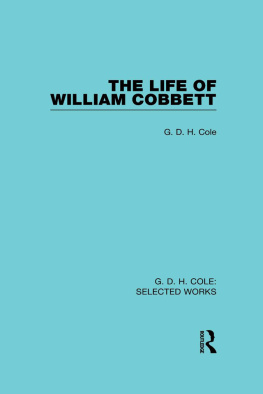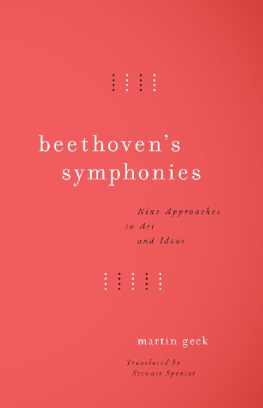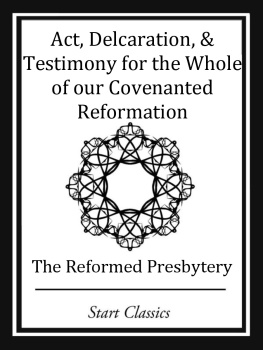The Project Gutenberg EBook of Beethoven's Symphonies Critically Discussed, by
Alexander Teetgen
This eBook is for the use of anyone anywhere at no cost and with
almost no restrictions whatsoever. You may copy it, give it away or
re-use it under the terms of the Project Gutenberg License included
with this eBook or online at www.gutenberg.org
Title: Beethoven's Symphonies Critically Discussed
Author: Alexander Teetgen
Release Date: September 23, 2012 [EBook #40849]
Language: English
*** START OF THIS PROJECT GUTENBERG EBOOK BEETHOVEN'S SYMPHONIES DISCUSSED ***
Produced by Linda Cantoni, Paul Marshall, Bryan Ness and
the Online Distributed Proofreading Team at
http://www.pgdp.net (This file was produced from images
generously made available by The Internet Archive/American
Libraries.)
Beethoven's Symphonies
Critically Discussed
BY
ALEXANDER TEETGEN
With Preface by John Broadhouse
London :
W. REEVES, 83 Charing Cross Road , W.C.
Dedication.
TO J. O'MABONY, ESQ.
Who taught me, when a happy schoolboyin the house of my beloved and venerated master, the Rev. Alfred Whitehead, M.A., and his dear wifeto sing at sight, who first fostered my passion for music; to that genial and highly accomplished man, who has vanished from my view for years, but not from my memory, where he resides ever, as a kind of Apollo Belvedere of those far-off daysthat New World to which the Columbus Man, may never return.
CONTENTS
| Page |
| v |
| 1 |
| 16 |
| 23 |
| 23 |
| 27 |
| 33 |
| 37 |
| 46 |
| 49 |
| 51 |
| 56 |
| 59 |
| 66 |
| 69 |
| 72 |
| 76 |
| 86 |
| 88 |
| 94 |
| 96 |
| 98 |
| 108 |
| 119 |
PREFACE.
These essays originally appeared in The Musical Standard, for which paper they were written.
While admitting that the author has at times been carried away by his exuberant fancy, it is impossible to deny that he possesses in a very high degree those powers of analysis without which it is impossible to do justice to, or even approximately to understand, Beethoven. Music is verily the language of the soulhigher, finer, more delicate in its methods, and more ethereal in its results, than anything to which the tongue can give utterance; expressing what speech cannot speak, and affecting, as no mere talking can, the invisible player who manipulates the keyboard of the human intellect, and whom we call The Soul. Music is truly of such a nature, and appeals so powerfully and mysteriously to that soul, that the words of Jean Paul seem quite justified,
Ich glaube, nur Gott versteht unser Musik.
Beethoven wrote such music as few even among those calling themselves musicians can understand, as the word is generally used; and which, in Jean Paul's sense of the word, is understood not at all. Like the ocean, or Mont Blanc, we can feel its power, while at the same time we are conscious that explanation would be almost desecration. We do not want Beethoven's music explained, but would rather be left alone with that which we can only feel, but cannot understand while hampered with "this mortal coil." Under the spell of such music, we can only explain the emotions it produces in us, and we can only do this in a fashion far from complete. Mr. Teetgen has only attempted an explanation of Beethoven's symphonies in this latter sense; and so far from feeling his little book as an impertinencewhich any attempt to explain Beethoven's music (his soul, id est) would bewe feel helped in our endeavours to understand something of the means by which the greatest tone-poet worked his incantations and wove his spells.
We cannot always agree with Mr. Teetgen in his estimate of other composersnotably, Mendelssohn, whom he holds in much lighter esteem than we do, and we could not endorse all he says of Mozart, either; he does not worship his great hero too much, but the others too little. Of his most intense admiration for Beethoven, however, none can doubt; and those who read this little work will, we think, agree with us in saying that Mr. Teetgen's analytical and descriptive powers, in dealing with the symphonies, are on a par with his veneration for the great master whom we all delight to honour, and who realised his own idealsome of us, at least, think so"There is nothing higher than thisto get nearer the Godhead than other men, and thence diffuse its beams over mankind." Fashions change in music as in other things; but Beethoven's music has in it that truth which, being eternal, cannot change; and we cannot conceive a state of culture so advanced that these Symphonies shall be deemed old-fashioned. If ever that condition is reached, it will be reached not by progression, but retrogression.
J. B.
BEETHOVEN'S SYMPHONIES CRITICALLY
AND SYMPATHETICALLY DISCUSSED
BEETHOVEN'S HARBINGERS.
 HERE are some words of such indefinite pregnancy that they expand the soul when we pronounce them. The highest of these I do not name; but "love" is one, "spirit" another, "immortality" another, and "symphony" another. We suppose, the first symphony was when "the morning stars shouted together for joy;" and the mystic world-tree, Igdrasil, with its "leaves of human existence," and myriad manifestations, maketh a symphony for ever in the ear of the Eternal. As music is sound, so perhaps all sound is music, to a higher beingeven the discord of pain, and the half cadence of sorrow being justified by a soul of meaning; just as music proper, itself would not be half so sweet or complete without its profound minors and expressive dissonances. The world is full of musicfrom the "tiny-trumpeting gnat" and the forest-buzz of summer, the happy murmur of the sea on its mother's breast, and the equally happy hum of the bee in the waxen cup, to the scream of the eagle and the roar of the lion, the thunder of the breakers and of heaven's artillery. Every one has observed how the very creak of a door may sometimes rise into music. And the whole world goeth up in music, swelling the symphony of the spheres. But, from these ground tonesthese universal hints to their human expression and counterpart in the "father of all such as handle the harp and organ," was a long, long way. Nature waited to produce her mouthpiece, Man, to manifest herself forth in that prolongation of herself which we call human nature. Then the vague sublimity of unfettered sound became incorporated in tonebecame consciousand spoke more humanly to the soul of man. At length, after a whole history of evolution, the pride of modern timesmodern musicappeared; and in due course, after a tottering infancy and empiric youth, the modern symphony. As in every case, the outcome is the result of an endless series of gradations; for, if nature abhors a vacuum, she at least equally abhors drawing a line, and taking a jump. Therefore, if we denominate brave old Haydn as the father or founder of the modern symphony, it is for happy convenience sake, and not because strictly accurate. Always there were Agamemnons before Agamemnon; and Haydn borrowed and imitated like everybody who is first student and then master (in his old age, sogar
HERE are some words of such indefinite pregnancy that they expand the soul when we pronounce them. The highest of these I do not name; but "love" is one, "spirit" another, "immortality" another, and "symphony" another. We suppose, the first symphony was when "the morning stars shouted together for joy;" and the mystic world-tree, Igdrasil, with its "leaves of human existence," and myriad manifestations, maketh a symphony for ever in the ear of the Eternal. As music is sound, so perhaps all sound is music, to a higher beingeven the discord of pain, and the half cadence of sorrow being justified by a soul of meaning; just as music proper, itself would not be half so sweet or complete without its profound minors and expressive dissonances. The world is full of musicfrom the "tiny-trumpeting gnat" and the forest-buzz of summer, the happy murmur of the sea on its mother's breast, and the equally happy hum of the bee in the waxen cup, to the scream of the eagle and the roar of the lion, the thunder of the breakers and of heaven's artillery. Every one has observed how the very creak of a door may sometimes rise into music. And the whole world goeth up in music, swelling the symphony of the spheres. But, from these ground tonesthese universal hints to their human expression and counterpart in the "father of all such as handle the harp and organ," was a long, long way. Nature waited to produce her mouthpiece, Man, to manifest herself forth in that prolongation of herself which we call human nature. Then the vague sublimity of unfettered sound became incorporated in tonebecame consciousand spoke more humanly to the soul of man. At length, after a whole history of evolution, the pride of modern timesmodern musicappeared; and in due course, after a tottering infancy and empiric youth, the modern symphony. As in every case, the outcome is the result of an endless series of gradations; for, if nature abhors a vacuum, she at least equally abhors drawing a line, and taking a jump. Therefore, if we denominate brave old Haydn as the father or founder of the modern symphony, it is for happy convenience sake, and not because strictly accurate. Always there were Agamemnons before Agamemnon; and Haydn borrowed and imitated like everybody who is first student and then master (in his old age, sogar





 HERE are some words of such indefinite pregnancy that they expand the soul when we pronounce them. The highest of these I do not name; but "love" is one, "spirit" another, "immortality" another, and "symphony" another. We suppose, the first symphony was when "the morning stars shouted together for joy;" and the mystic world-tree, Igdrasil, with its "leaves of human existence," and myriad manifestations, maketh a symphony for ever in the ear of the Eternal. As music is sound, so perhaps all sound is music, to a higher beingeven the discord of pain, and the half cadence of sorrow being justified by a soul of meaning; just as music proper, itself would not be half so sweet or complete without its profound minors and expressive dissonances. The world is full of musicfrom the "tiny-trumpeting gnat" and the forest-buzz of summer, the happy murmur of the sea on its mother's breast, and the equally happy hum of the bee in the waxen cup, to the scream of the eagle and the roar of the lion, the thunder of the breakers and of heaven's artillery. Every one has observed how the very creak of a door may sometimes rise into music. And the whole world goeth up in music, swelling the symphony of the spheres. But, from these ground tonesthese universal hints to their human expression and counterpart in the "father of all such as handle the harp and organ," was a long, long way. Nature waited to produce her mouthpiece, Man, to manifest herself forth in that prolongation of herself which we call human nature. Then the vague sublimity of unfettered sound became incorporated in tonebecame consciousand spoke more humanly to the soul of man. At length, after a whole history of evolution, the pride of modern timesmodern musicappeared; and in due course, after a tottering infancy and empiric youth, the modern symphony. As in every case, the outcome is the result of an endless series of gradations; for, if nature abhors a vacuum, she at least equally abhors drawing a line, and taking a jump. Therefore, if we denominate brave old Haydn as the father or founder of the modern symphony, it is for happy convenience sake, and not because strictly accurate. Always there were Agamemnons before Agamemnon; and Haydn borrowed and imitated like everybody who is first student and then master (in his old age, sogar
HERE are some words of such indefinite pregnancy that they expand the soul when we pronounce them. The highest of these I do not name; but "love" is one, "spirit" another, "immortality" another, and "symphony" another. We suppose, the first symphony was when "the morning stars shouted together for joy;" and the mystic world-tree, Igdrasil, with its "leaves of human existence," and myriad manifestations, maketh a symphony for ever in the ear of the Eternal. As music is sound, so perhaps all sound is music, to a higher beingeven the discord of pain, and the half cadence of sorrow being justified by a soul of meaning; just as music proper, itself would not be half so sweet or complete without its profound minors and expressive dissonances. The world is full of musicfrom the "tiny-trumpeting gnat" and the forest-buzz of summer, the happy murmur of the sea on its mother's breast, and the equally happy hum of the bee in the waxen cup, to the scream of the eagle and the roar of the lion, the thunder of the breakers and of heaven's artillery. Every one has observed how the very creak of a door may sometimes rise into music. And the whole world goeth up in music, swelling the symphony of the spheres. But, from these ground tonesthese universal hints to their human expression and counterpart in the "father of all such as handle the harp and organ," was a long, long way. Nature waited to produce her mouthpiece, Man, to manifest herself forth in that prolongation of herself which we call human nature. Then the vague sublimity of unfettered sound became incorporated in tonebecame consciousand spoke more humanly to the soul of man. At length, after a whole history of evolution, the pride of modern timesmodern musicappeared; and in due course, after a tottering infancy and empiric youth, the modern symphony. As in every case, the outcome is the result of an endless series of gradations; for, if nature abhors a vacuum, she at least equally abhors drawing a line, and taking a jump. Therefore, if we denominate brave old Haydn as the father or founder of the modern symphony, it is for happy convenience sake, and not because strictly accurate. Always there were Agamemnons before Agamemnon; and Haydn borrowed and imitated like everybody who is first student and then master (in his old age, sogar